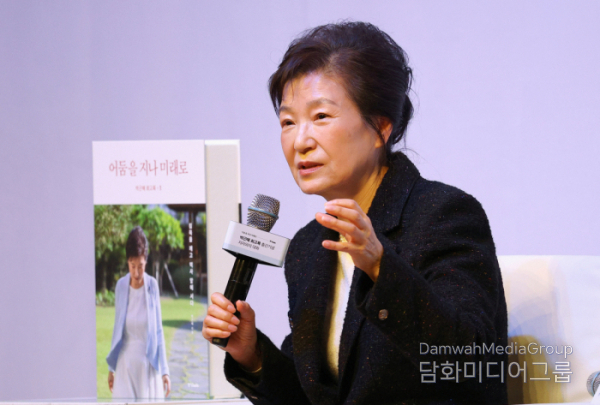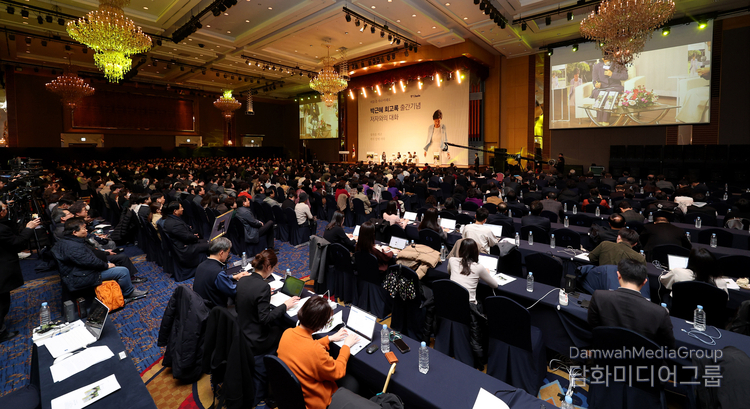By UN Journal Lee Kap-soo
"As a person who served as president, I wrote my memoirs with the hope that they would serve as a lesson for future generations by revealing what I regretted and what I did well," said former President Park Geun-hye at the launch of her memoirs, "Park Geun-hye Memoirs: Past the Darkness and into the Future.
On the same day, Park also released for the first time a handwritten memo she wrote in late fall 2021, when she was imprisoned for more than four years and nine months.

At a book release ceremony held at a hotel in Daegu, Park said that in late 2021, about half a year before the 2022 presidential election, she wrote a note thinking, "If I bear all this, it will be resolved," and delivered it to her lawyer Yoo Young-ha. The unpublished handwritten memo was released through the publishing house “Jungang Books.”
"I wanted to clear up the lies and misunderstandings about me and reveal that the public officials and businessmen I worked with worked for the country and the people, so I silently followed the procedures set by the Constitution and laws," Park wrote in the memo.
"However, after an additional arrest warrant was issued against me on October 16, 2017, I decided that further trial proceedings were pointless and asked for leniency for public officials and businessmen instead of taking all the historical yoke and responsibility on myself," Park wrote.

On March 31, 2017, an arrest warrant was issued for Park and she was taken into custody at the Seoul Detention Center. When her detention was extended in October of the same year, she refused to attend the trial, calling it "political retribution. In detention, she also refused to meet with her lawyers, except for Yoo Young-ha, who resigned after representing her during the impeachment trial.
In the memo, Park wrote, "It was a painful experience for me to watch the things I did with all my might while serving as president being branded as accumulated evils and public officials who worked faithfully to fulfill their duties being detained." "I felt the impermanence of life as I watched even those who had been with me from the beginning of my political career hand over all their burdens to me," Park wrote.
Park said, "But I will accept this as my fate. As president of the Republic of Korea, I firmly defended security against dark forces that jeopardized the country, and the time I spent trying to provide a better life for the people was rewarding," she said, recalling her presidency.
"I don't have any regrets about my life after the 2006 terrorist attacks because I thought my life was given to me as a bonus and dedicated to the country," she said. "I will now bury all yokes," Park said. I don't blame or resent anyone. I hope we can build a better Korea by supporting each other," she concluded.
Heo Won-je, a former chief of staff under the former President Park Geun-hye, and Yoo Young-ha, a lawyer who represented Park in her defense, were among the questioners at the book launch event.
"Through this memoir, I realized that I owe a lot to you," Park said in a video greeting, "I had disappointments and frustrations, but my memoir would not have been possible without the people who watched over me with unwavering faith."
"I would like to repay the people's great love and contribute even a little to the development of our country in the future," she said. "It is said that history repeats itself and teaches us lessons. Looking back, there were many regrettable times and regrettable things," she explained. "I hope my memoir will be a small stepping stone to a better future," she said.
The memoir was published in two volumes, each about 400 pages long. It covers Park's political life for nearly a decade, from the end of 2012, after the 18th presidential election, to March 2022, when she moved into her residence in Dalseong-gun, Daegu.
In her memoirs, Park is said to have revealed her daily life during her imprisonment, when she stacked large Korean dictionaries and used them as chairs because she did not have a proper chair despite her deteriorating health and severe back pain.
The memoir also includes subheadings such as "Kim Jong-in, who accused me of receiving business lobbying," and "Yoo Seung-min's loss of contact," referring to Kim Jong-in, the former general election chairman who worked with her during the presidential campaign, and Yoo Seung-min, a former lawmaker who was the leader of the ruling Saenuri Party.




